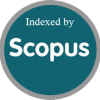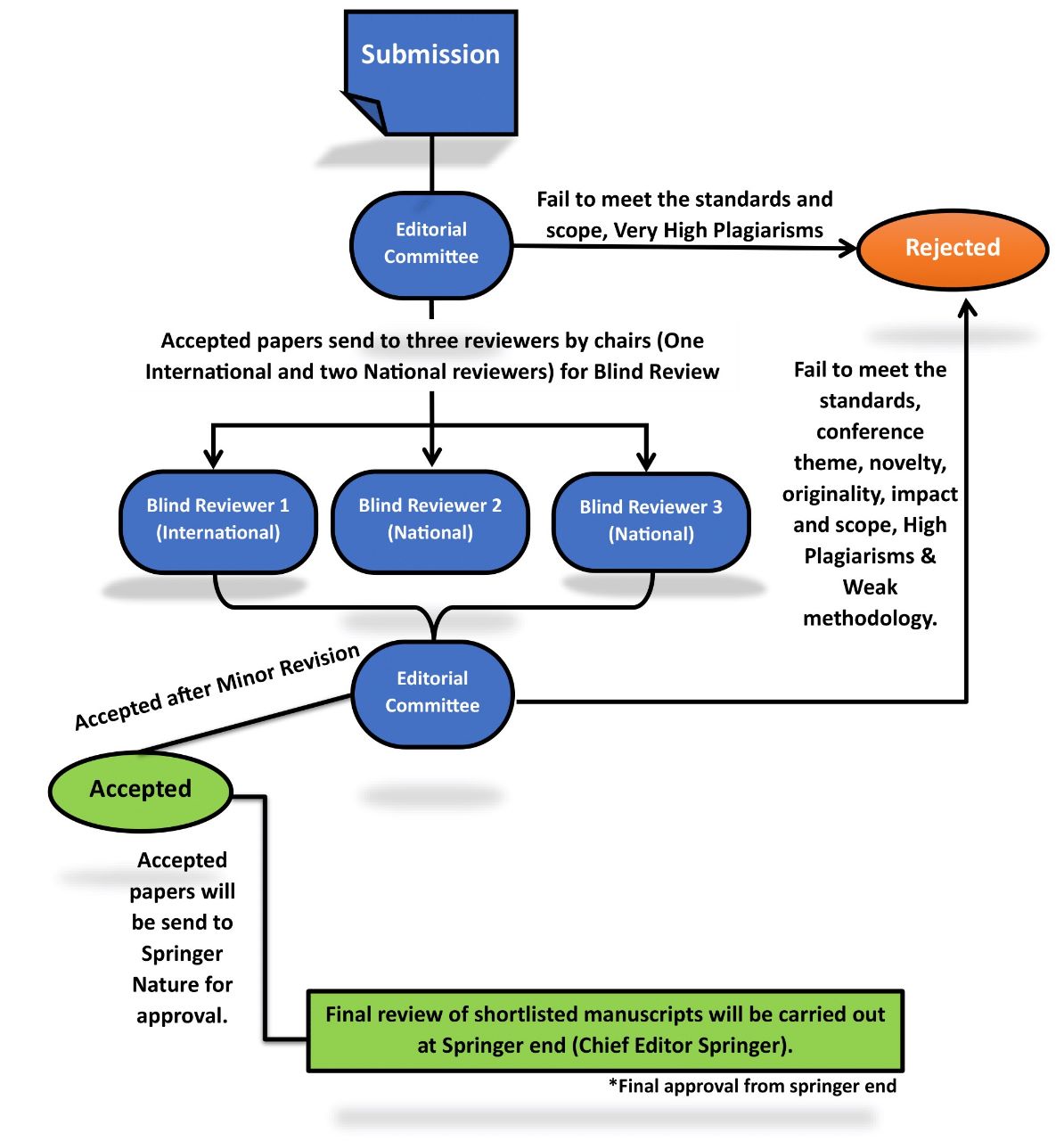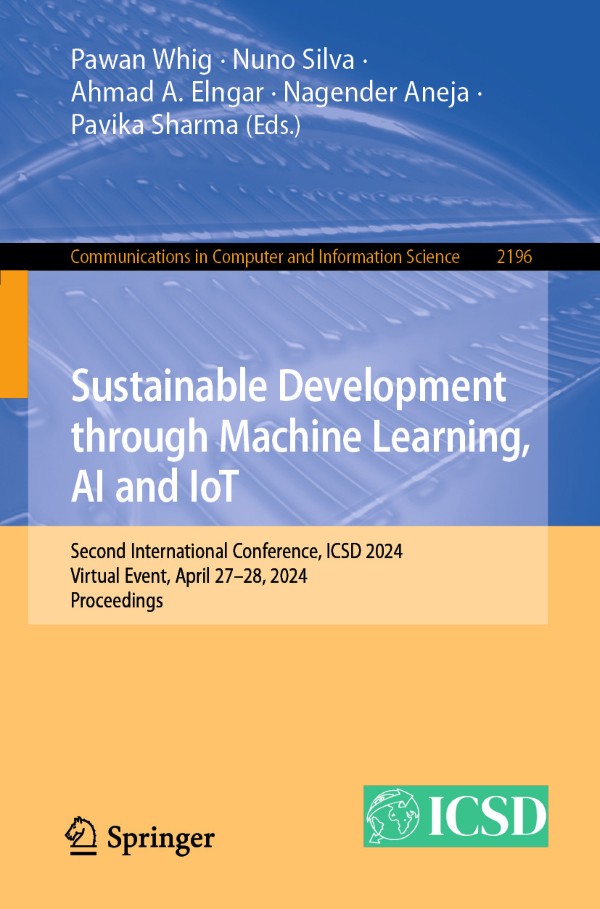
Two Days International Conference ICSD 14-15th June 2025
the Best Place to Publish
Your New Ideas
on Sustainable Development, Machine Learning, AI, and IoT
- Selected conference papers have been given the opportunity to be published in SCI/Scopus Journal Electronics, a prestigious platform for high-quality research.
- Selected papers are published in Journal of Autonomous intelligence (Scopus Index)
Selected papers are published in “The International Journal of Sustainable Development Through AI, ML, and IoT”, Double-Blind Peer-Reviewed Journal, ISSN (Online): 2584-0827, Submitted For Scopus index Evaluation
- It is planned to publish the proceedings with Springer in their Communications in Computer and Information Science series (will be indexed in major scientific databases including Scopus) (final approval pending)
Introduction to Conference
The “International Conference on Sustainable Development” is a platform where academics, researchers, and practitioners gather to discuss the latest developments in sustainable development. In recent years, the conference has seen a significant increase in interest in the intersection of Machine Learning, Artificial Intelligence (AI), and Internet of Things (IoT) with sustainable development.
Machine Learning (ML) and AI have the potential to play a significant role in achieving sustainable development goals. For instance, they can help in predicting environmental and climatic changes, monitoring natural resources, and developing efficient waste management systems. ML and AI can also be used to optimize energy consumption and reduce carbon emissions by analyzing data from energy-efficient buildings and smart grids.
Moreover, IoT is a game-changer in the field of sustainable development, as it enables the monitoring and control of environmental and energy-related data in real-time. IoT sensors and devices can provide valuable data on air quality, water management, and waste management, among other things. This data can be analyzed using ML and AI algorithms to develop sustainable solutions for a variety of applications.
The integration of ML, AI, and IoT has the potential to create new opportunities for sustainable development. For instance, it can enable the development of smart cities, which use technology to improve efficiency and reduce the environmental impact of urban areas. Additionally, ML, AI, and IoT can be used to monitor and predict the impact of climate change on ecosystems, leading to more effective conservation efforts.
The integration of ML, AI, and IoT with sustainable development has the potential to transform the way we address environmental challenges. The International Conference on Sustainable Development serves as an important platform for researchers and practitioners to share their ideas and collaborate on new solutions to create a more sustainable future.
Review Process
At our conference, we ensure a rigorous review process to maintain the highest standards of quality and integrity in the papers presented. Each submitted paper goes through multiple stages of evaluation, involving esteemed reviewers, our conference chair, and plagiarism detection software. Here’s an overview of our comprehensive review process:
1. Expert Reviewers:
Once a paper is submitted, it undergoes a thorough review by three esteemed reviewers who are experts in their respective fields. These reviewers meticulously assess the paper based on various factors, including but not limited to:
– Originality and novelty of the research
– Methodology and experimental design
– Clarity and organization of the paper
– Soundness of the conclusions drawn
– Relevance and significance of the research to the conference theme
– Contribution to the existing body of knowledge
The reviewers provide detailed feedback, suggestions, and recommendations to the authors to help improve the paper’s quality.
2. Conference Chair Evaluation:
After the initial review by the expert reviewers, the paper is carefully examined by our respected conference chair. This evaluation aims to identify any intricacies, potential gaps, or inconsistencies in the paper. The conference chair ensures that the paper aligns with the conference’s objectives and maintains a high level of academic integrity.
3. Plagiarism Check:
To maintain the originality of the research presented at our conference, all papers are subjected to a thorough plagiarism check using the highly regarded iThenticate software. This software compares the submitted paper against a vast database of academic and research publications, as well as online sources. Any paper found to have more than 10% similarity with existing works is rejected and the authors are asked to revise and resubmit their paper after addressing the plagiarism concerns.
Our commitment to upholding academic integrity and ensuring the quality of research presented at the conference is paramount. We strive to provide an unbiased and rigorous review process that encourages innovative and impactful contributions to the field. Review Process FlowChart

Topic For Paper Submission
The topics for paper submission at the International Conference on Sustainable Development, with a focus on the intersection of Machine Learning, Artificial Intelligence, and Internet of Things with sustainable development, could include:
- Smart cities and sustainable development.
- Machine learning and artificial intelligence for environmental monitoring and prediction.
- Internet of Things for energy management and efficiency.
- Sustainable waste management using AI and IoT.
- Renewable energy forecasting using machine learning.
- Sustainable agriculture and precision farming using IoT and AI.
- Sustainable transportation using AI and IoT.
- Natural resource management and conservation using ML and AI.
- Climate change impact analysis and adaptation using IoT and AI.
- Smart water management using IoT and ML.
- Machine learning and artificial intelligence for predicting and mitigating natural disasters.
- Sustainable supply chain management using IoT and blockchain technology.
- Energy-efficient buildings and smart grids using ML and AI.
- Environmental impact assessment and sustainable development using IoT and AI.
- AI and IoT-enabled green supply chain management for circular economy.
- Smart waste collection systems using IoT and machine learning for sustainable cities.
- Intelligent transportation systems for reducing carbon emissions and congestion.
- Precision environmental monitoring for ecological conservation using AI and IoT.
- Smart grids and demand response management using machine learning for energy conservation.
- AI and IoT for sustainable tourism and smart tourism destinations.
Submission Dates / Registration Fee
Submission Dates
Start of Paper Submission | 01 Sep 2024 |
Final Paper Submission | 01 Jan 2025 |
Notification of Acceptance | 30 March 2025 |
Registration | 30 April 2025 |
Conference date | 14 ,15 June 2025 |
Registration Fee
International Participants | USD 500 |
SAARC IEEE Members | USD 200 |
Corporate Participants (in INR) | Rs 9500 |
Research Scholar (in INR) | Rs 8500 |
Students (in INR) | Rs 7500 |
Threws Member | 50% discount |
Payment Process
Step 1 Click on the button below that will redirect you to threws official website.
Step 2 Login or Register your Self in the Website in order to do Payment for your Registration.
Step 3 Fill the Details and Complete the Payment.
Call for Papers

International Conference on Sustainable Development, Machine Learning, AI, and IoT
Date: 14 ,15 June 2025
Location: Vivekananda Institute, New Delhi, India
Submission Deadline: 01 Jan 2025
Contact Email: conference@icsd.threws.com
We invite researchers, practitioners, and academics to submit original and innovative research papers that address the theme of sustainable development in the context of machine learning, artificial intelligence, and the Internet of Things. Topics of interest include, but are not limited to:
- Sustainable development goals and machine learning
- AI for sustainable urban development
- IoT for smart and sustainable cities
- Machine learning for renewable energy systems
- AI for sustainable agriculture and food systems
- IoT for smart and sustainable transportation
- Machine learning for sustainable manufacturing and production
- AI for sustainable natural resource management
- IoT for sustainable water management
- Machine learning for sustainable waste management
- AI for sustainable tourism and heritage management
- IoT for sustainable buildings and infrastructure
Submission Guidelines: Papers must be written in English.
- Papers should be no longer than 12-15 pages, including figures, tables and references and be on Springer Format (Download Format).
- Papers must be formatted using the conference template, which will be provided.
- Papers should be submitted in PDF format.
- Papers should be original and not have been previously published or currently under review by another conference or journal.
- Papers will be reviewed by at least three members of the International Program Committee.
- Accepted papers will be published in the conference proceedings.
- At least one author of each accepted paper must register for the conference and present the paper.
- Submissions should be made through the conference’s online submission system, (conference@icsd.threws.com).
- Please include the title of the paper, the names and affiliations of the authors, and a brief abstract (150-200 words) in the submission.
Conference Chairs:
- Dr. Pawan Whig(Senior IEEE Member) India , pawanwhig@gmail.com,
- Dr. Nuno Silva Chief Scientific and Technology Officer, London, United Kingdom
- Dr. MZM (Marta Zurek-Mortka), Poland, Senior Researcher in the Department of Control Systems, Łukasiewicz Research Network
- Dr.Ahmad A. Elngar(Head of Computers and AI) Beni-Suef University, Egypt
- Dr. Nagender Aneja (Asst. Prof. Program Leader (Computer Science) in Universiti, Brunei Darussalam
- Dr Anupriya Jain, Professor School of Computer Applications, MRIIRS
- Dr. Rattan Sharma, Professor Emritus, Delhi School of Buisness, New Delhi, India
- Dr. Raghav Prasad Parouha, Indira Gandhi National Tribal University, Amarkantak, M.P., India
- Dr. Harleen Kaur, Associate Professor, Department of Computer Science and Engineering, Jamia Hamdard University, New Delhi, India
- Yasser A. Al Tamimi, Associate Professor of Linguistics and Chair of the Department of Humanities and Social Sciences at Alfaisal University in Riyadh, Kingdom of Saudi Arabia
Co-Conference Chairs:
- Dr. Pavika Sharma (India) pavika.sharma2@gmail.com
- Rahul Reddy Nadikattu (USA) rahulnadi40@gmail.com
- Ashima Bhatnagar Bhatia (India) ashimabbhatia01@gmail.com
- Radhika Mahajan (India), VIPS-TC radhika.ar7@gmail.com
- Prof. Dr. hab. Eng. Jerzy Szymanski (Professor in Transport, Electrical Engineering and Computer Science), Poland
- Dr. Kavita Mittal (Professor Computer Science and Engineering), Jims University, India
- Dr. Indira Routaray , Dean, International Education & Associate Professor in Mathematics @CGU-Odisha
- Dr. Bhawna Narwal, (Assistant Professor, Department of IT, IGDTUW ), India
- Dr. Pooja Bhati , Ph.D. (Mechanical Engineering, Fabrication of polymeric tubes)
Indian Institute of Technology, Delhi - Ronak Ravjibhai Pansara, Master Data Specialist, Tesla Draper, Utah, USA
Other Technical Program Committee Members:
- Ashok Kumar Reddy Nadikattu (Senior Software Engineer at Arissoft Technologies), USA, Reddyashok541@gmail.com
- Niharikareddy Meenigea(Data Analyst at Ablabs),USA, Meenigeaharika@gmail.com
- Samrajyam Singu (Software Engineer at Vanguard ),USA, Samrajyamsingu@gmail.com
- Mahesh Tunguturi( Sr. DevOps Engineer at DXC),USA, Mahesht529@gmail.com
- Venkata Ravi Kiran Kolla ( Sr. Data Engineer at DTE Energy),USA, Venkat0634@gmail.com
- Rahul Reddy Naddikattu (University of The Cumberland),USA
- Prof.(Dr.) Sandeep Kautish, Director-Academics, LBEF Campus, Kathmandu (Nepal)
- Sudeep Tanwar (Senior Member, IEEE) is working as a full professor at the Nirma University, India. He is also a Visiting Professor with Jan Wyzykowski University, Poland, and the University of Pitesti, Romania.
- Dr. Surendra Kumar, formerly Senior Scientist Bhabha Atomic Research Centre ( BARC ),Distinguished Professor
- Dr. Mirza Tariq Beg (Prof.) https://www.jmi.ac.in/electronics/faculty-members/Dr_Mirza_Tariq_Beg-1763
- Dr. S. Naseem Ahmad (Retd.) Professor https://www.jmi.ac.in/electronics/faculty-members/dr_s_naseem_ahmad-1773
- Dr. Imran Ahmed Khan https://www.jmi.ac.in/electronics/faculty-members/Dr_Imran_Ahmed_Khan-3816
- Dr. Ravi panwar http://faculty.iiitdmj.ac.in/faculty/rpanwar
- Dr. Tajinder Singh Arora Assistant Professor https://portfolios.nituk.ac.in/430/tajinder-singh-arora/personal-details
- Dr. Md Rashid Mahmood Professor GNITC, Hyderabad
- Monica Malik, Security Engineer, NetApp, Bangalore
- Dr. Manu Gupta, Associate Dean Placements and Assistant Professor, Department of ECM
Sreenidhi Institute of Science and Technology, Hyderabad - Dr. Vijay Singh, Himachal Pradesh University, Shimla-5
- Dr. Umesh Pathak, Group Financial Controller, Nesuto Australia
- Dr. Astha, the Pharmacist incharge NSW, Australia
- Ms. Suman, Transport Officier, Incharge of Sustainable Development, Sydney Metro, Australia
- Ms. Nishtha Rajput, Project Manager, VAMED, Germany
- Abhay Dutt Paroha, Affiliation: SLB, Houston, TX, USA
- Dr. Megha, Associate Professor, School of Computing, Assistant Dean, Research & Consultancy, DIT University, Dehradun, Uttarakhand, India
- Dr. Seema Sharma, Manav Rachna International Institute of Research and Studies, India
- Shirish Mane, Independent Researcher, USA
Contact: Dr. Pawan Whig (Country Head Threws)
Vivekananda Institute of Professional Studies-TC
9811908699
pawanwhig@gmail.com
We look forward to receiving your submissions and to an exciting and productive conference in New Delhi!
More Information
We are delighted to introduce our Conference Chair for the International Conference on Sustainable Development with a focus on Machine Learning, AI, and IoT. Dr. Pawan whig is an experienced and respected leader in the field of sustainable development and is committed to advancing the use of machine learning, AI, and IoT to achieve sustainability goals.
ICSD-2025 has an impressive track record in leading and organizing successful conferences and events related to sustainable development. Their expertise in the field of machine learning, AI, and IoT is widely recognized, and they have made significant contributions to the advancement of sustainable development globally. Their leadership, knowledge, and experience will be invaluable in ensuring the success of the International Conference on Sustainable Development.
As Conference Chair, ICSD-2025 will oversee the planning and execution of the conference, working closely with the National Advisory Board and the various committees to create an engaging and inspiring program that addresses the challenges and opportunities of sustainable development using machine learning, AI, and IoT. They will also be responsible for selecting and inviting keynote speakers and ensuring that the conference runs smoothly and successfully.
We are honored to have Dr. Pawan Whig as our Conference Chair, and we are confident that their vision, leadership, and expertise will help to make the International Conference on Sustainable Development a truly memorable and impactful event.
Conference Chair
- Dr. Pawan Whig(Senior IEEE Member) India , pawanwhig@gmail.com,
- Dr. Nuno Silva Chief Scientific and Technology Officer, London, United Kingdom
- Dr. MZM (Marta Zurek-Mortka), Poland, Senior Researcher in the Department of Control Systems, Łukasiewicz Research Network
- Dr.Ahmad A. Elngar(Head of Computers and AI) Beni-Suef University, Egypt
- Dr. Nagender Aneja (Asst. Prof. Program Leader (Computer Science) in Universiti Brunei Darussalam)
Co Conference Chairs:
- Dr. Pavika Sharma (India) pavika.sharma2@gmail.com
- Rahul Reddy Nadikattu (USA) rahulnadi40@gmail.com
- Ashima Bhatnagar Bhatia (India) ashimabbhatia01@gmail.com
- Radhika Mahajan (India), VIPS-TC radhika.ar7@gmail.com
- Prof. Dr. hab. Eng. Jerzy Szymanski (Professor in Transport, Electrical Engineering and Computer Science), Poland
- Dr. Kavita Mittal (Professor Computer Science and Engineering), Jims University, India
- Dr. Indira Routaray , Dean, International Education & Associate Professor in Mathematics @CGU-Odisha
- Dr. Bhawna Narwal, (Assistant Professor, Department of IT, IGDTUW ), India
- Dr. Pooja Bhati , Ph.D. (Mechanical Engineering, Fabrication of polymeric tubes)
Indian Institute of Technology, Delhi
Other Program Committee Members:
- Ashok Kumar Reddy Nadikattu (Senior Software Engineer at Arissoft Technologies), USA, Reddyashok541@gmail.com
- Niharikareddy Meenigea(Data Analyst at Ablabs),USA, Meenigeaharika@gmail.com
- Samrajyam Singu (Software Engineer at Vanguard ),USA, Samrajyamsingu@gmail.com
- Mahesh Tunguturi( Sr. DevOps Engineer at DXC),USA, Mahesht529@gmail.com
- Venkata Ravi Kiran Kolla ( Sr. Data Engineer at DTE Energy),USA, Venkat0634@gmail.com
- Rahul Reddy Naddikattu (University of The Cumberland),USA
- Prof.(Dr.) Sandeep Kautish, Director-Academics, LBEF Campus, Kathmandu (Nepal)
- Sudeep Tanwar (Senior Member, IEEE) is working as a full professor at the Nirma University, India. He is also a Visiting Professor with Jan Wyzykowski University, Poland, and the University of Pitesti, Romania.
- Dr. Surendra Kumar, formerly Senior Scientist Bhabha Atomic Research Centre ( BARC ),Distinguished Professor
- Dr. Mirza Tariq Beg (Prof.) https://www.jmi.ac.in/electronics/faculty-members/Dr_Mirza_Tariq_Beg-1763
- Dr. S. Naseem Ahmad (Retd.) Professor https://www.jmi.ac.in/electronics/faculty-members/dr_s_naseem_ahmad-1773
- Dr. Imran Ahmed Khan https://www.jmi.ac.in/electronics/faculty-members/Dr_Imran_Ahmed_Khan-3816
- Dr. Ravi panwar http://faculty.iiitdmj.ac.in/faculty/rpanwar
- Tajinder Singh Arora Assistant Professor https://portfolios.nituk.ac.in/430/tajinder-singh-arora/personal-details
- Dr. Md Rashid Mahmood Professor GNITC, Hyderabad
- Dr. Umesh Pathak, Group Financial Controller, Nesuto Australia
- Dr. Astha, the Pharmacist incharge NSW, Australia
- Ms. Suman, Transport Officier, Incharge of Sustainable Development, Sydney Metro, Australia
- Ms. Nishtha Rajput, Project Manager, VAMED, Germany
- Monica Malik, Security Engineer, NetApp, Bangalore4
International Convenors
- Rahul Reddy Naddikattu (University of The Cumberland),USA
- Dr. Surendra Kumar, formerly Senior Scientist Bhabha Atomic Research Centre ( BARC ),Distinguished Professor
- Ashok Kumar Reddy Nadikattu (Senior Software Engineer at Arissoft Technologies), USA, Reddyashok541@gmail.com
- Niharikareddy Meenigea(Data Analyst at Ablabs),USA, Meenigeaharika@gmail.com
- Samrajyam Singu (Software Engineer at Vanguard ),USA, Samrajyamsingu@gmail.com
- Mahesh Tunguturi( Sr. DevOps Engineer at DXC),USA, Mahesht529@gmail.com
- Venkata Ravi Kiran Kolla ( Sr. Data Engineer at DTE Energy),USA, Venkat0634@gmail.com
- Rahul Reddy Naddikattu (University of The Cumberland),USA
- Prof.(Dr.) Sandeep Kautish, Director-Academics, LBEF Campus, Kathmandu (Nepal)
- Sudeep Tanwar (Senior Member, IEEE) is working as a full professor at the Nirma University, India. He is also a Visiting Professor with Jan Wyzykowski University, Poland, and the University of Pitesti, Romania.
Reviewers
At the International Conference on Sustainable Development with a focus on Machine Learning, AI, and IoT, we are committed to ensuring the highest quality of academic standards in all the papers presented at the conference. In this regard, we are pleased to announce that all National and International Advisory Board members will act as peer reviewers in addition to other experts.
All papers submitted to the conference will be reviewed by at least two peer reviewers, including a National or International Advisory Board member. The peer review process will be managed by our experienced team of reviewers, who will ensure that all papers meet the rigorous standards of the conference.
The National and International Advisory Board members bring a wealth of knowledge and experience to the peer review process. Their expertise and insights will be invaluable in ensuring that the papers presented at the conference are of the highest quality and contribute significantly to the field of sustainable development using machine learning, AI, and IoT.
In addition to the National and International Advisory Board members, we have also assembled a team of experienced and qualified reviewers who will work closely with the board members to ensure the quality of all papers submitted to the conference.
We believe that the peer review process is an essential part of maintaining the academic rigor and integrity of the conference. We are committed to ensuring that all papers presented at the conference meet the highest standards and contribute significantly to the field of sustainable development using machine learning, AI, and IoT.
We are confident that the National and International Advisory Board members, in addition to the other experts involved in the peer review process, will help us achieve this goal and ensure that the conference is a success.
Editorial Committee for CCIS
Pawan Whig, Senior IEEE Member Dean Research VIPS
Mirza Tariq Beg (Prof.) https://www.jmi.ac.in/electronics/faculty-members/Dr_Mirza_Tariq_Beg-1763
Dr. S. Naseem Ahmad (Retd.) Professor https://www.jmi.ac.in/electronics/faculty-members/dr_s_naseem_ahmad-1773
Ashima Bhatnagar Bhatia, ashimabbhatia01@gmail.com
Dr. Surendra Kumar, formerly Senior Scientist Bhabha Atomic Research Centre ( BARC ),Distinguished Professor & Professor-in-Charge Sharda University, Executive Director NIET, and Advisor Selaqui Academy of higher Education, Dehradun is presently working as Director, Rajasthan Institute of Engineering & Technology, Jaipur. He did his Master’s Degree with specialization in Electronics from Agra University in 1966 and completed one year special Atomic Energy Orientation training in Nuclear Technology at BARC Training School in 1967.
He then joined as scientist in Electronics Division, BARC, Trombay, Mumbai. Dr. Surendra Kumar was awarded INDO-FRG Fellowship in 1986. Through INDO-FRG bilateral exchange program, he completed advance training in Electronics at HMI, Berlin and received Invention Notification for the research work done by him during his stay at HMI Berlin, Germany (1986- 87). He completed his Ph.D. from University of Mumbai (Ph.D. Centre – BARC ) in 1990.
As a special reference, bio-data of Dr. Surendra Kumar is listed in :
- The International Directory for Distinguished Leadership; Inc Raleigh USA(1997)
- The Handbook on Engineering Education (1999) and
- MARQUIS : Who’s Who in the World (2009 ).
During his tenure at BARC for more than 25 years, he completed many prestigious projects of Department of Atomic Energy. As Officer-in-charge, Data Acquisition and Accelerator Control Group, he was leading a team of engineers and scientists for research, design & development of data acquisition, processing and control systems for applications in Nuclear Accelerator
Technology and Bio-medical sciences.
Dr. Surendra Kumar had a long association of 25 years with BARC training school in various capacities as Professor and Course Coordinator of PG courses and Member, Steering and Selection Committees. He developed course modules on Nuclear Electronics, Microprocessors and Computer Organization for trainees in BARC Training School.
Dr. Surendra Kumar is having a rich experience of establishing engineering institutions of high repute with proven success records. As a Founder Principal / Director he contributed effectively in establishing engineering institutions; Xavier Institute of Engineering, BVCOE, IGCE, SIET, ABES, GVAIET & TEC. At university level also he contributed a lot in education reforms as Member, Academic Council, GGSIP University, Delhi; Member, Board of Studies, University of Mumbai and Member, Board of Studies and Curriculum Development, Sharda University.
Dr. Surendra Kumar is having professional affiliations to IEEE, ISTE, IETE, IPA & CSI (Founder Secretary, CSI, Navi Mumbai Chapter). He had been on panel of experts/examiners of DAE, DRDO, IIT ( B ), BITS Pilani, Mumbai University, Pune University, Shivaji University, GGSIP University, UPTU and Sharda University.
Dr. Surendra Kumar has traveled abroad extensively to a number of international research centers & technical institutions and delivered expert lectures. He represented BARC and DAE on various national and international committees. He has published a number of high quality research papers in reputed journals. He delivered 37 invited talks in national / international conferences & seminars. Know-how of his research works were transferred to M/S ECIL, India and M/S B. struck, Germany for development of systems for applications in Nuclear Science & Engineering ( Reactor and Accelerator Technology).
Kiran Jiwargi (Dell USA)
Kiran Jewargi is Systems Engineer at Dell Technologies. I have more than 22 years of experience in computer and enterprise data storage industry. I am expert in storage controller architect and have worked for various storage device companies, designing, architecting enterprise data storage like NVMe, SCM, QLC, SSD and HDD solution, Virtualization, Hyperconverged systems, Clustering, and cloud computing. I am expert in performance storage, persistent and non-volatile memory, computer networking. I am expert in designing and developing solution based on NVM express computation storage, On-prem infrastructure solution, Private cloud solution, Hybrid and Multicloud solutions, Next generation datacenter solution, Cyber recovery solution, Disaster recovery and backup solution and extensive experience in block, file, object storage solutions.
Ujjwal Sharma
Talented engineer with more than 6 years of experience in Research and Development, Electrical and Hardware Engineering, Embedded System Lifecycle, Debugging PCBA’s, Practical Lab Experience, Failure Analysis of PCBA’s, Program Management, Verification and Validation Testing and Hardware Engineering.
- Worked with the Embedded Software team for board bring up using Linux Ubuntu OS and shell scripts, IPMI, Changed BIOS parameters in board bring of Host PC.
- Experienced in complex embedded systems with FPGA, ASIC, NXP MPC8270 PowerQUIC II microprocessor
- architecture, 256 MB Flash, Micron Technology MT48LC SDRAM and TMS320F2809 Digital Signal Controller.
- Experienced in troubleshooting analog skills such as measuring inrush current, DAC Ramp Output waveform, Clock Frequency and digital skills such as setting up COM Port BAUD Rate, Parity and Flow Control.
We are pleased to introduce the National Advisory Board for the International Conference on Sustainable Development with a focus on Machine Learning, AI, and IoT. The board comprises a diverse group of individuals who bring a wealth of knowledge and expertise to the conference.
The board members have been carefully selected based on their professional backgrounds and experience in the areas of sustainable development, artificial intelligence, machine learning, IoT, renewable energy, urban planning, and circular economy. Their role is to provide guidance and support to the conference organizers, review and select keynote speakers, and provide recommendations for the conference program.
The board members are experts in their fields and have made significant contributions to the advancement of sustainable development using machine learning, AI, and IoT. They bring a wealth of experience and knowledge to the conference and will provide valuable insights on the latest trends and developments in their respective fields.
We are honored to have such distinguished individuals on our National Advisory Board, and we are confident that their guidance and support will be invaluable to the success of the International Conference on Sustainable Development. We look forward to working with them to create an impactful and inspiring conference program that will help shape the future of sustainable development using machine learning, AI, and IoT.
- Dr. Mirza Tariq Beg (Prof.) https://www.jmi.ac.in/electronics/faculty-members/Dr_Mirza_Tariq_Beg-1763
- Dr. S. Naseem Ahmad (Retd.) Professor https://www.jmi.ac.in/electronics/faculty-members/dr_s_naseem_ahmad-1773
- Dr. Imran Ahmed Khan https://www.jmi.ac.in/electronics/faculty-members/Dr_Imran_Ahmed_Khan-3816
- Dr. Ravi panwar http://faculty.iiitdmj.ac.in/faculty/rpanwar
- TAJINDER SINGH ARORA ASSISTANT PROFESSOR https://portfolios.nituk.ac.in/430/tajinder-singh-arora/personal-details
- Dr. Md Rashid Mahmood Professor GNITC, Hyderabad
- Ashima Bhatnagar Bhatia , VIPS-TC ashimabbhatia01@gmail.com
- Dr. Pavika Sharma , BPIT, New Delhi pavika.sharma2@gmail.com
International Industry/Academia Advisory
We are pleased to introduce the International Advisory Board for the International Conference on Sustainable Development with a focus on Machine Learning, AI, and IoT. The board comprises a diverse group of international experts who bring a wealth of knowledge and expertise to the conference.
The board members have been carefully selected based on their professional backgrounds and experience in the areas of sustainable development, artificial intelligence, machine learning, IoT, renewable energy, urban planning, and circular economy. Their role is to provide guidance and support to the conference organizers, review and select keynote speakers, and provide recommendations for the conference program.
The board members are experts in their fields and have made significant contributions to the advancement of sustainable development using machine learning, AI, and IoT globally. They bring a wealth of experience and knowledge to the conference and will provide valuable insights on the latest trends and developments in their respective fields.
We are honored to have such distinguished international experts on our International Advisory Board, and we are confident that their guidance and support will be invaluable to the success of the International Conference on Sustainable Development. We look forward to working with them to create an impactful and inspiring conference program that will help shape the future of sustainable development using machine learning, AI, and IoT globally.
- Ashok Kumar Reddy Nadikattu (Senior Software Engineer at Arissoft Technologies), USA, Reddyashok541@gmail.com
- Olivia Wilson, Director Threws, Distinguished leader and innovator in the global Startup Ecosystem, Olivia.Wilson@threws.com
- Niharikareddy Meenigea(Data Analyst at Ablabs),USA, Meenigeaharika@gmail.com
- Samrajyam Singu (Software Engineer at Vanguard ),USA, Samrajyamsingu@gmail.com
- Mahesh Tunguturi( Sr. DevOps Engineer at DXC),USA, Mahesht529@gmail.com
- Venkata Ravi Kiran Kolla ( Sr. Data Engineer at DTE Energy),USA, Venkat0634@gmail.com
- Rahul Reddy Naddikattu (University of The Cumberland),USA
- Prof.(Dr.) Sandeep Kautish, Director-Academics, LBEF Campus, Kathmandu (Nepal)
- Sudeep Tanwar (Senior Member, IEEE) is working as a full professor at the Nirma University, India. He is also a Visiting Professor with Jan Wyzykowski University, Poland, and the University of Pitesti, Romania.
- Dr. Surendra Kumar, formerly Senior Scientist Bhabha Atomic Research Centre ( BARC ),Distinguished Professor
- Jonathan Patterson, Threws President, Visionary leader

Conference Chairs

International Convenors

National Convenors

National Convenors

National Convenors

National Convenors

National Convenors

International Industry/Academia Advisory

National Convenors

Keynote Speaker

International Industry/Academia Advisory

International Industry/Academia Advisory

International Industry/Academia Advisory

International Industry/Academia Advisory

International Industry/Academia Advisory

Keynote Speaker

National Convenors

National Convenors

National Convenors

International Industry/Academia Advisory

Chief Scientific and Technology Officer

Asst. Prof. Program Leader (Computer Science)

Professor in Transport, Electrical Engineering and Computer Science

Ex-Director, IQAC (Institutional Quality Assurance Cell)

Senior Researcher at Lukasiewicz Research Network - Institute for Sustainable Technologies

Professor Computer Science and Engineering

Associate Professor, Dept of Mathematics

Distinguished leader and innovator in the global Startup Ecosystem

Threws President, Visionary leader
Frequently Asked Questions
A hybrid mode conference is a conference that offers both in-person and virtual attendance options.
Yes, you can attend the conference in person. We will be following all recommended safety guidelines to ensure a safe and comfortable in-person experience.
Yes, you can attend the conference virtually. We will be offering virtual attendance options for those who are unable to attend in person.
No, all attendees will have access to the same conference content regardless of whether they attend in person or virtually.
To attend the conference virtually, you will need a reliable internet connection, a computer or mobile device, and access to the conference platform.
Yes, we will be offering virtual networking opportunities for attendees to connect with both in-person and virtual attendees.
Yes, all conference sessions will be recorded and made available for later viewing for both in-person and virtual attendees.

